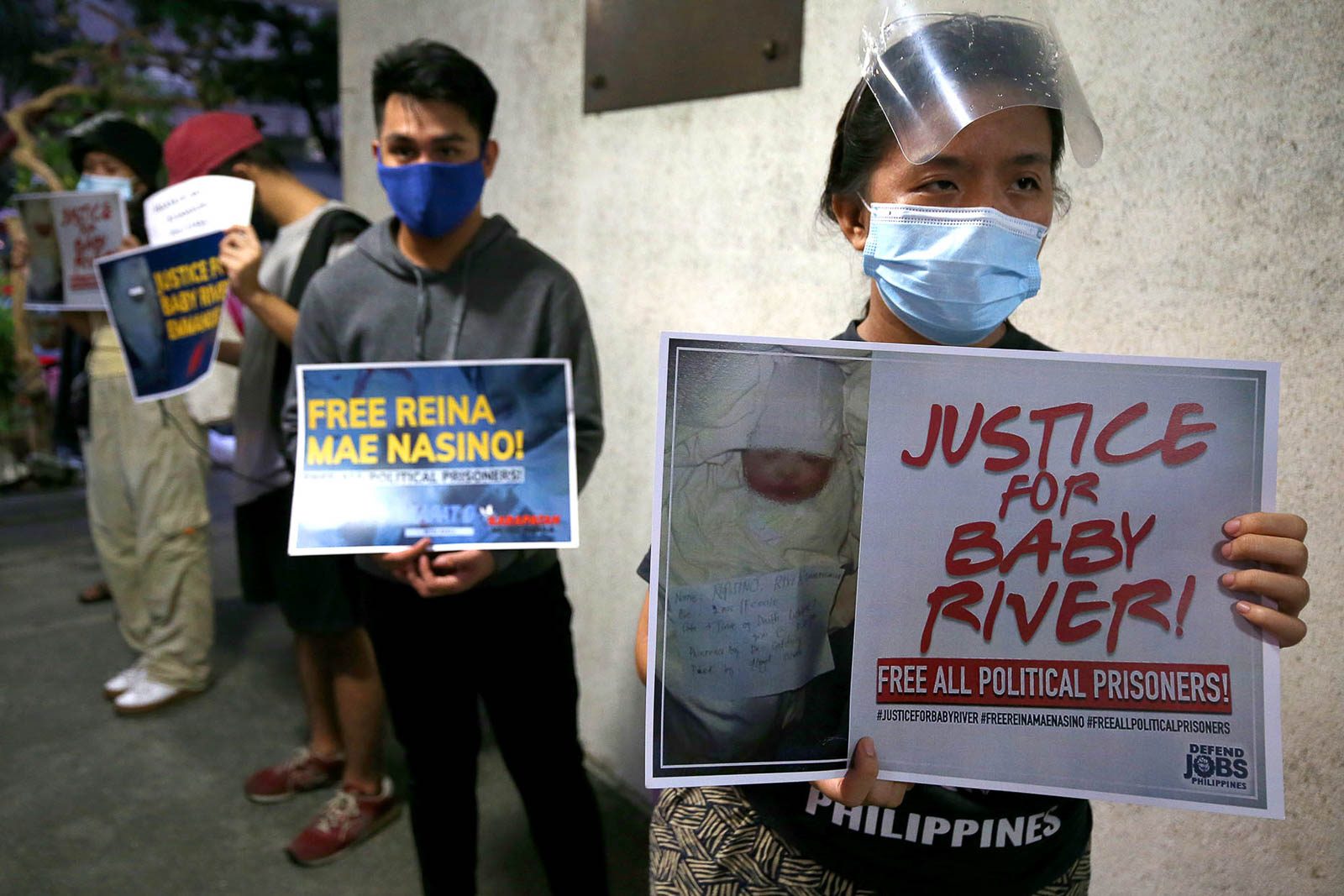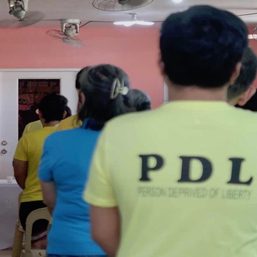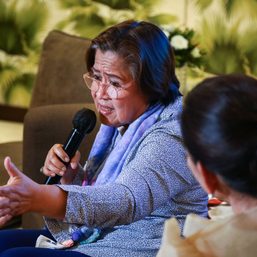SUMMARY
This is AI generated summarization, which may have errors. For context, always refer to the full article.

Activist Reina Mae Nasino, through the National Union of Peoples’ Lawyers (NUPL), has filed an administrative complaint before the Supreme Court seeking the dismissal of Manila Judge Marivic Balisi-Umali for alleged gross ignorance of the law and gross misconduct.
Nasino’s mother Marites Asis and NUPL’s Kathy Panguban filed the administrative complaint against Umali on Friday, November 20. The complaint detailed some of the actions of Umali in handling Nasino’s case, which they alleged to have violated the Code of Judicial Conduct.
The Supreme Court has jurisdiction on administrative suits against judges.
“(Nasino) is compelled, with all humility and sans rancor, to pray of this Honorable Office that Judge Balisi-Umali be dismissed from the service with forfeiture of retirement benefits,” said the complaint.
Complaints
The NUPL said Umali violated Canon 3 of the Code of Judicial Conduct which requires judges to perform their duties with impartiality and diligence.
The meat of the complaint is Umali’s denial of Nasino’s requests involving her baby River, who died at 3 months old in October in a case that put a spotlight on the judiciary and its inadequacies.
Nasino was arrested with other activists in November 2019 for alleged illegal possession of firearms and explosives. She learned she was pregnant, while in detention, in February 2020.
On June 25, Nasino requested for a pre-natal checkup and hospital admission citing the lack of proper pre-natal care inside the Manila City Jail. Before Umali could rule, Nasino already gave birth to River on July 1 – the newborn was underweight at only 5.5 pounds despite being born full-term. (PODCAST: Law of Duterte Land: Philippine courts and the death of a baby River)
Nasino was able to keep River with her inside jail for a month. Her lawyers requested Umali to let Nasino keep her baby for a year either inside jail or at the hospital, but Umali denied this, citing lack of jail resources,
“Her rulings on the separation of the complainant and baby River are not only contrary to these existing laws and rules, they are also heartless and callous. The respondent judge demonstrated unabashed preference for (Jail Superintendent Ignacia) Monteron, whose words she regarded like gospel truth, and became a party to the complainant’s cruel and inhumane treatment and punishment,” said the complainant.
River was separated from her mother on August 13. River died on October 9 because of pneumonia complications.
The NUPL sought to inhibit Umali from the case. The judge voluntarily inhibited and said in her decision that one of NUPL’s lawyers was untruthful. Umali said the lawyer lied that Nasino breastfed River when, according to the jail officer, the baby was fed formula milk.
The complaint cited transcripts of virtual visitation calls where a jail officer acknowledged Nasino was breastfeeding, and Nasino telling her lawyer her nipples were chapped because of it.
According to the complaint, Nasino resorted to mix-feeding when a jail officer advised her to give her daughter formula milk. The complaint said Umali took the jail officer’s words “hook, line and sinker,” and did not ask any one of them to clarify.
The complaint accused Umali of not following Republic Act No. 7600 or the Rooming-in and Breastfeeding Act of 1992, RA 10028 or the Expanded Breastfeeding Law, and the Bangkok Rules on Treatment of Women Prisoners. The NUPL said all this amounted to gross ignorance of the law.
“She should be held accountable for her unjust interlocutory orders that enabled the continuing violation of the complainant’s constitutional rights and gave way to the forcible weaning of her newborn child, which led to her serious illness and eventual demise,” said the complaint.
The search warrant
The complaint also cited Umali’s orders involving the search warrant that resulted in Nasino’s arrest in November 2019, part of a massive crackdown on activists.
The NUPL disputed the legality of the search warrant, including how the police applied for it before Quezon City Judge Cecilyn Burgos-Villavert, and whether the warrant had the right address.
Around February, NUPL moved to obtain Villavert’s records as part of a move to quash Nasino’s charge before she is arraigned. One loses pre-arraignment remedies after the arraignment, and the NUPL wanted to boost their motion to quash arguments by using what they will find in the records.
Villavert told NUPL that according to rules of the Office of the Court Administrator (OCA), she would need a subpoena from Umali to turn over her records.
According to the complaint, Umali told the NUPL to seek an exemption to the rule from the OCA itself. NUPL wrote OCA afterwards.
Umali denied the motion to quash on July 1, and denied the appeals on July 22. (READ: Supreme Court must ‘get real’ about prison conditions)
The NUPL said that Umali’s “repeated refusal to subpoena” Villavert’s records “is unconscionable, considering that accessing these records is essential to the exercise of the accused’s right to be informed of the nature of the accusation against him or her.”
Umali said in her July 22 order that “it is premature for the Court to require the presentation of the record of the application for search warrant considering that the pre-trial of the cases have yet to be terminated and the prosecution has yet to present its evidence.”
“(We) made it clear to the respondent judge that they intend to access the search warrant records for purposes of availing of the pre-arraignment remedy of quashing the search warrants. Why the respondent judge would suddenly consider the matter as premature is puzzling,” said the complaint.
“The respondent judge acted with conscious indifference to the rights of the complainant and her co-accused. Now, the complainant is bereft of a child,” the complaint added. – Rappler.com
Add a comment
How does this make you feel?
![[Rappler Investigates] Who’s fooling who?](https://www.rappler.com/tachyon/2024/02/rodrigo-sara-duterte-2019.jpeg?resize=257%2C257&crop=167px%2C0px%2C900px%2C900px)









There are no comments yet. Add your comment to start the conversation.